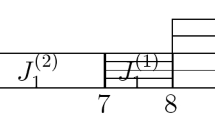Abstract
We consider the scheduling problems arising when two agents, each with a family of jobs, compete to perform their respective jobs on a single machine. A setup time is needed for a job if it is the first job to be processed on the machine or its processing on the machine follows a job that belongs to another family. Each agent wants to minimize a certain cost function, which depends on the completion times of its jobs only. The aim is to find a schedule for all the jobs of the two agents that minimizes the objective of one agent while keeping the objective of the other agent being bounded by a fixed value \(Q\). Polynomial-time and pseudo-polynomial-time algorithms are designed to solve the problem involving various combinations of regular scheduling objective functions.
Similar content being viewed by others
References
Agnetis A, Billaut JC, Gawiejnowicz S, Pacciarelli D, Souhal A (2014) Multi-agent scheduling. Springer, Berlin
Agnetis A, Mirchandani PB, Pacciarelli D, Pacifici A (2007) Multi-agent single machine scheduling. Ann Oper Res 150:3–15
Agnetis A, Pacciarelli D, Pacifici A (2004) Scheduling problems with two competing agents. Oper Res 52:229–242
Agnetis A, Pascale G, Pacciarelli D (2009) A Lagrangian approach to single-machine scheduling problems with two competing agents. J Sched 12:401–415
Allahverdi A, Ng CT, Cheng TCE, Kovalyov MY (2008) A survey of scheduling problems with setup times or costs. Eur J Oper Res 187:985–1032
Arbib C, Smriglio S, Servilio M (2004) A competitive scheduling problem and its relevance to UMTS channel assignment. Networks 44:132–141
Baker KR, Smith JC (2003) A multiple-criterion model for machine scheduling. J Sched 6:7–16
Bruno J, Downey P (1978) Complexity of task sequencing with deadlines, setup times and changeover cost. SIAM J Comput 7:393–404
Cheng TCE, Ng CT, Yuan JJ (2006) Multi-agent scheduling on a single machine to minimize total weighted number of tardy jobs. Theor Comput Sci 362:273–281
Cheng TCE, Ng CT, Yuan JJ (2008) Multi-agent scheduling on a single machine with max-form criteria. Eur J Oper Res 188:603–609
Fan BQ, Cheng TCE, Li SS, Feng Q (2013) Bounded parallel-batching scheduling with two competing agents. J Sched 16:261–271
Ghosh JB (1994) Batch scheduling to minimize total completion time. Oper Res Lett 16:271–275
Ghosh JB, Gupta JND (1997) Batch scheduling to minimize maximum lateness. Oper Res Lett 21:77–80
Hamers H, Borm P, Tijs S (1995) On games corresponding to sequencing situations with ready times. Math Program 69:471–483
Karp RM (1972) Reducibility among combinatorial problems. In: Miller RE, Thatcher JW (eds) Complexity of computer computations. Plenum Press, New York
Kim K, Poulon BC, Petrie CJ, Lesser VR (2000) Compensatory negotiation for agent-based project schedule coordination. CIFE working paper \(\sharp \)55, Stanford University
Kovalyov MY, Oulamara A, Soukhal A (2012) Two-agent scheduling with agent specific batches on an unbounded serial batching machine. In: The 2nd international symposium on combinatorial optimization, ISCO 7422. Lecture notes in computer science, Athens
Lawler EL (1977) A “pseudo-polynomial” time algorithm for sequencing jobs to minimize total tardiness. Ann Discrete Math 1:331–342
Leung JYT, Pinedo M, Wan G (2010) Competitive two-agent scheduling and its applications. Oper Res 58:458–469
Li SS, Yuan JJ (2009) Scheduling with families of jobs and delivery coordination under job availability. Theor Comput Sci 410:4856–4863
Li SS, Yuan JJ (2012) Unbounded parallel-batching scheduling with two competitive agents. J Sched 15:629–640
Monma CL, Potts CN (1989) On the complexity of scheduling with batch setup times. Oper Res 37:798–804
Mor B, Mosheiov G (2010) Scheduling problems with two competing agents to minimize minmax and minsum earliness measures. Eur J Oper Res 206:540–546
Mor B, Mosheiov G (2011) Single machine batch scheduling with two competing agents to minimize total flowtime. Eur J Oper Res 215:524–531
Ng CT, Cheng TCE, Yuan JJ (2006) A note on the complexity of the problem of two-agent scheduling on a single machine. J Comb Optim 12:387–394
Peha JM (1995) Heterogeneous-criteria scheduling: minimizing weighted number of tardy jobs and weighted completion time. Comput Oper Res 22:1089–1100
Perez-Gonzalez P, Framinan JM (2014) A common framework and taxonomy for multicriteria scheduling problems with interfering and competing jobs: Multi-agent scheduling problems. Eur J Oper Res 235:1–16
Potts CN, Kovalyov MY (2000) Scheduling with batching: a review. Eur J Oper Res 120:228–249
Potts CN, Van Wassenhove LN (1992) Integrating scheduling with batching and lot-sizing: a review of algorithms and complexity. J Oper Res Soc 43:395–406
Wan G, Vakati SR, Leung JYT, Pinedo M (2010) Scheduling two agents with controllable processing times. Eur J Oper Res 205:528–539
Yuan JJ, Shang WP, Feng Q (2005) A note on the scheduling with two families of jobs. J Sched 8:537–542
Acknowledgments
The authors would like to thank the associate editor and one anonymous reviewer for their helpful comments and suggestions on an earlier version of our paper. Li was supported in part by National Natural Science Foundation of China (Nos. 11326191, 11401605 and 11171313), and the Education Department of Henan Province Natural Science Research Program (No. 14A110027). Feng was in part by National Natural Science Foundation of China (11401604), NSF of Henan Province (No. 132300410392).
Author information
Authors and Affiliations
Corresponding author
Rights and permissions
About this article
Cite this article
Li, SS., Chen, RX. & Feng, Q. Scheduling two job families on a single machine with two competitive agents. J Comb Optim 32, 784–799 (2016). https://doi.org/10.1007/s10878-015-9902-x
Published:
Issue Date:
DOI: https://doi.org/10.1007/s10878-015-9902-x




